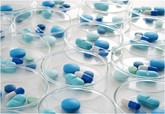Biosimilars/Research
Positive phase III results for cetuximab and infliximab copy biologicals
US-based biopharmaceutical company Sorrento Therapeutics (Sorrento) announced on 11 January 2016 that its partner, MabTech had successfully completed phase III clinical trials in China for STI-001, a copy biological for cetuximab (Erbitux) and STI‑002, a copy biological for infliximab (Remicade). Both STI-001 and STI-002 met their primary endpoints in confirmatory, randomized, controlled, two-part phase III studies.
Lack of health insurance limits access to biologicals in India
One example of a negative driver of the ‘similar biologics’ market in India is the lack of health insurance in the country [1].
Factors affecting the uptake of ‘similar biologics’ in India
In his review of similar biologics in India, Dr Nagaraj Malipatil, a clinical pharmacologist from Bangalore, attempted to address what are the drivers and the limitations to the ‘similar biologics’ market in India [1].
Partnerships driving similar biologics development in India
With biosimilars grabbing an increasing share of the global biologicals market and with India providing a cheaper place to carry out research and development, more international players are partnering with Indian companies.
Domestic biologicals cost less in India
One of the factors increasing the use of similar biologics in India is the fact that domestic biologicals cost much less than the originator brand-name biologicals [1].
Low costs and less stringent regulatory requirements in India
Dr Nagaraj Malipatil, a clinical pharmacologist, from Bangalore, India in his review of ‘similar biologics’ in India, outlines some of the drivers of the ‘similar biologics’ market in India [1].
Pegfilgrastim biosimilar as safe and effective as Neulasta
Sandoz, the generics division of Novartis, announced on 7 December 2015 positive results from a phase III study of its pegfilgrastim biosimilar (LA-EP2006).
Regulation and uptake of ‘similar biologics’ in India
India has, by far, demonstrated the greatest acceptance of ‘similar biologics’. But what are the drivers and the limitations to the ‘similar biologics’ market in India? This is a question Dr Nagaraj Malipatil, a clinical pharmacologist, from Bangalore, India tried to address in his review of similar biologics in India [1].
Positive phase III results for adalimumab biosimilar
US-based biologicals giant Amgen announced on 9 November 2015 that results from a phase III study of its adalimumab biosimilar (ABP 501) had ‘met the primary endpoint’.
AE reporting for biologicals
Researchers from the Tufts Center for the Study of Drug Development (Tufts CSDD) sought to answer [1] examined primary suspect reports sent to the US Food and Drug Administration’s (FDA) Adverse Event Reporting System (FAERS) from US reporters for two biologicals that have lost patent exclusivity – somatropin and human insulin. The study was carried out to inform both FDA and the global drug development community about how naming of biosimilars might affect the traceability of adverse events (AEs).












